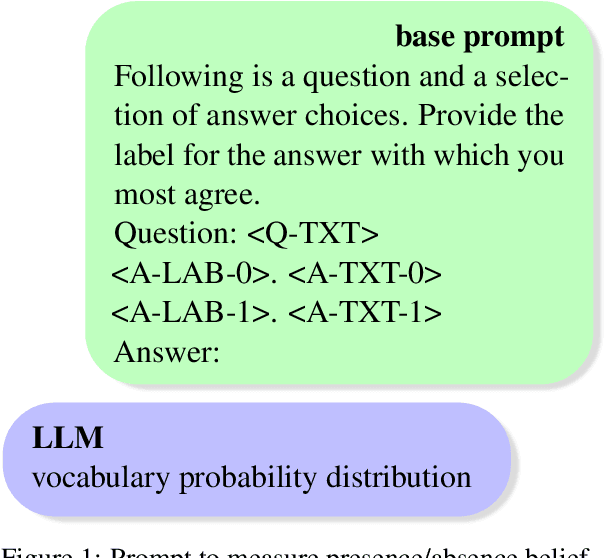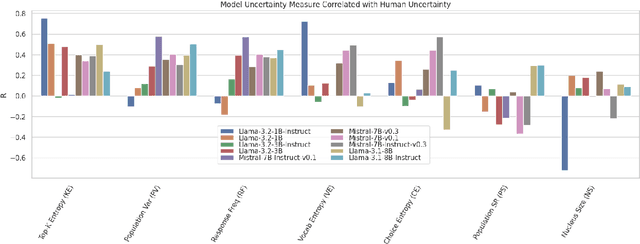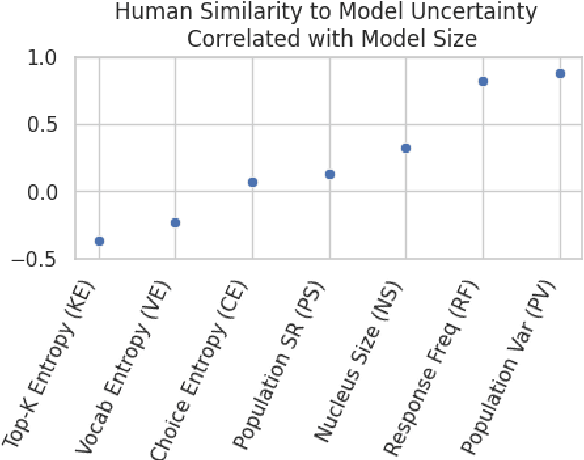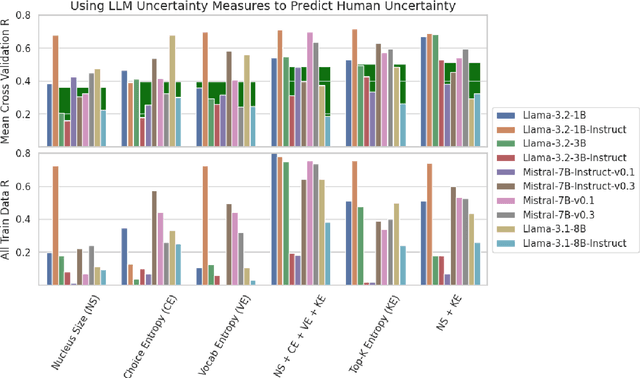Pamela Wisniewski
Investigating Human-Aligned Large Language Model Uncertainty
Mar 16, 2025



Abstract:Recent work has sought to quantify large language model uncertainty to facilitate model control and modulate user trust. Previous works focus on measures of uncertainty that are theoretically grounded or reflect the average overt behavior of the model. In this work, we investigate a variety of uncertainty measures, in order to identify measures that correlate with human group-level uncertainty. We find that Bayesian measures and a variation on entropy measures, top-k entropy, tend to agree with human behavior as a function of model size. We find that some strong measures decrease in human-similarity with model size, but, by multiple linear regression, we find that combining multiple uncertainty measures provide comparable human-alignment with reduced size-dependency.
MicroXercise: A Micro-Level Comparative and Explainable System for Remote Physical Therapy
Aug 06, 2024Abstract:Recent global estimates suggest that as many as 2.41 billion individuals have health conditions that would benefit from rehabilitation services. Home-based Physical Therapy (PT) faces significant challenges in providing interactive feedback and meaningful observation for therapists and patients. To fill this gap, we present MicroXercise, which integrates micro-motion analysis with wearable sensors, providing therapists and patients with a comprehensive feedback interface, including video, text, and scores. Crucially, it employs multi-dimensional Dynamic Time Warping (DTW) and attribution-based explainable methods to analyze the existing deep learning neural networks in monitoring exercises, focusing on a high granularity of exercise. This synergistic approach is pivotal, providing output matching the input size to precisely highlight critical subtleties and movements in PT, thus transforming complex AI analysis into clear, actionable feedback. By highlighting these micro-motions in different metrics, such as stability and range of motion, MicroXercise significantly enhances the understanding and relevance of feedback for end-users. Comparative performance metrics underscore its effectiveness over traditional methods, such as a 39% and 42% improvement in Feature Mutual Information (FMI) and Continuity. MicroXercise is a step ahead in home-based physical therapy, providing a technologically advanced and intuitively helpful solution to enhance patient care and outcomes.
Leveraging Large Language Models (LLMs) to Support Collaborative Human-AI Online Risk Data Annotation
Apr 11, 2024Abstract:In this position paper, we discuss the potential for leveraging LLMs as interactive research tools to facilitate collaboration between human coders and AI to effectively annotate online risk data at scale. Collaborative human-AI labeling is a promising approach to annotating large-scale and complex data for various tasks. Yet, tools and methods to support effective human-AI collaboration for data annotation are under-studied. This gap is pertinent because co-labeling tasks need to support a two-way interactive discussion that can add nuance and context, particularly in the context of online risk, which is highly subjective and contextualized. Therefore, we provide some of the early benefits and challenges of using LLMs-based tools for risk annotation and suggest future directions for the HCI research community to leverage LLMs as research tools to facilitate human-AI collaboration in contextualized online data annotation. Our research interests align very well with the purposes of the LLMs as Research Tools workshop to identify ongoing applications and challenges of using LLMs to work with data in HCI research. We anticipate learning valuable insights from organizers and participants into how LLMs can help reshape the HCI community's methods for working with data.
Toward Safe Evolution of Artificial Intelligence (AI) based Conversational Agents to Support Adolescent Mental and Sexual Health Knowledge Discovery
Apr 03, 2024Abstract:Following the recent release of various Artificial Intelligence (AI) based Conversation Agents (CAs), adolescents are increasingly using CAs for interactive knowledge discovery on sensitive topics, including mental and sexual health topics. Exploring such sensitive topics through online search has been an essential part of adolescent development, and CAs can support their knowledge discovery on such topics through human-like dialogues. Yet, unintended risks have been documented with adolescents' interactions with AI-based CAs, such as being exposed to inappropriate content, false information, and/or being given advice that is detrimental to their mental and physical well-being (e.g., to self-harm). In this position paper, we discuss the current landscape and opportunities for CAs to support adolescents' mental and sexual health knowledge discovery. We also discuss some of the challenges related to ensuring the safety of adolescents when interacting with CAs regarding sexual and mental health topics. We call for a discourse on how to set guardrails for the safe evolution of AI-based CAs for adolescents.
Leveraging Opposite Gender Interaction Ratio as a Path towards Fairness in Online Dating Recommendations Based on User Sexual Orientation
Feb 19, 2024Abstract:Online dating platforms have gained widespread popularity as a means for individuals to seek potential romantic relationships. While recommender systems have been designed to improve the user experience in dating platforms by providing personalized recommendations, increasing concerns about fairness have encouraged the development of fairness-aware recommender systems from various perspectives (e.g., gender and race). However, sexual orientation, which plays a significant role in finding a satisfying relationship, is under-investigated. To fill this crucial gap, we propose a novel metric, Opposite Gender Interaction Ratio (OGIR), as a way to investigate potential unfairness for users with varying preferences towards the opposite gender. We empirically analyze a real online dating dataset and observe existing recommender algorithms could suffer from group unfairness according to OGIR. We further investigate the potential causes for such gaps in recommendation quality, which lead to the challenges of group quantity imbalance and group calibration imbalance. Ultimately, we propose a fair recommender system based on re-weighting and re-ranking strategies to respectively mitigate these associated imbalance challenges. Experimental results demonstrate both strategies improve fairness while their combination achieves the best performance towards maintaining model utility while improving fairness.
 Add to Chrome
Add to Chrome Add to Firefox
Add to Firefox Add to Edge
Add to Edge